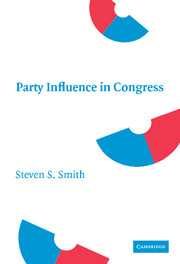Book contents
- Frontmatter
- Contents
- Acknowledgments
- 1 Introduction
- 2 The Microfoundations of Theories of Congressional Parties
- 3 The Types and Sources of Party Influence
- 4 The Search for Direct Party Effects
- 5 Recent Theories of Party Influence: Cartel and Conditional Party Government Theory
- 6 Revisiting Pivotal and Party Politics
- 7 Reexamining the Direct and Indirect Influence of Party in the House and Senate
- 8 More Than a Conclusion
- Appendix
- References
- Index
6 - Revisiting Pivotal and Party Politics
Published online by Cambridge University Press: 05 June 2012
- Frontmatter
- Contents
- Acknowledgments
- 1 Introduction
- 2 The Microfoundations of Theories of Congressional Parties
- 3 The Types and Sources of Party Influence
- 4 The Search for Direct Party Effects
- 5 Recent Theories of Party Influence: Cartel and Conditional Party Government Theory
- 6 Revisiting Pivotal and Party Politics
- 7 Reexamining the Direct and Indirect Influence of Party in the House and Senate
- 8 More Than a Conclusion
- Appendix
- References
- Index
Summary
The challenge of median voter and pivotal politics theories of legislative politics requires additional consideration. In Chapter 4, I argued that Krehbiel's 1993 challenge was misconceived and applied unpersuasively and, after reviewing the subsequent literature on direct party influence, observed that the evidence for significant party effects was beginning to accumulate (Krehbiel 1993). Krehbiel has persisted in his challenge (Crombez et al. 2006; Krehbiel 1997b, 1998, 2000, 2003, 2005; Krehbiel et al. 2005; Krehbiel and Wiseman 1999). Most of my argument about Krehbiel's 1993 challenge applies to the subsequent work. Most important, the assumption of unidimensionality, the treatment of preferences as independent of party effects, and absence of a full multivariate model of the forces at work in legislators' voting decisions remain issues in most of the follow-up efforts. Nevertheless, the more recent challenges are quite varied and, judging by the steady flow of published work, persuasive to some readers.
I cannot fully digest and evaluate this volume of commentary, analysis, and empirical analysis here, but two of Krehbiel's efforts are particularly deserving of evaluation. The first is the set of claims about minimal (direct) party influence in Krehbiel's 1998 book, Pivotal Politics. Remarkably, most of Krehbiel's claims about party effects in this book have not been challenged, at least not directly. In this chapter, I show that there are party effects in many of the places where Krehbiel chooses to emphasize the force of pivotal politics.
- Type
- Chapter
- Information
- Party Influence in Congress , pp. 148 - 176Publisher: Cambridge University PressPrint publication year: 2007
- 1
- Cited by



